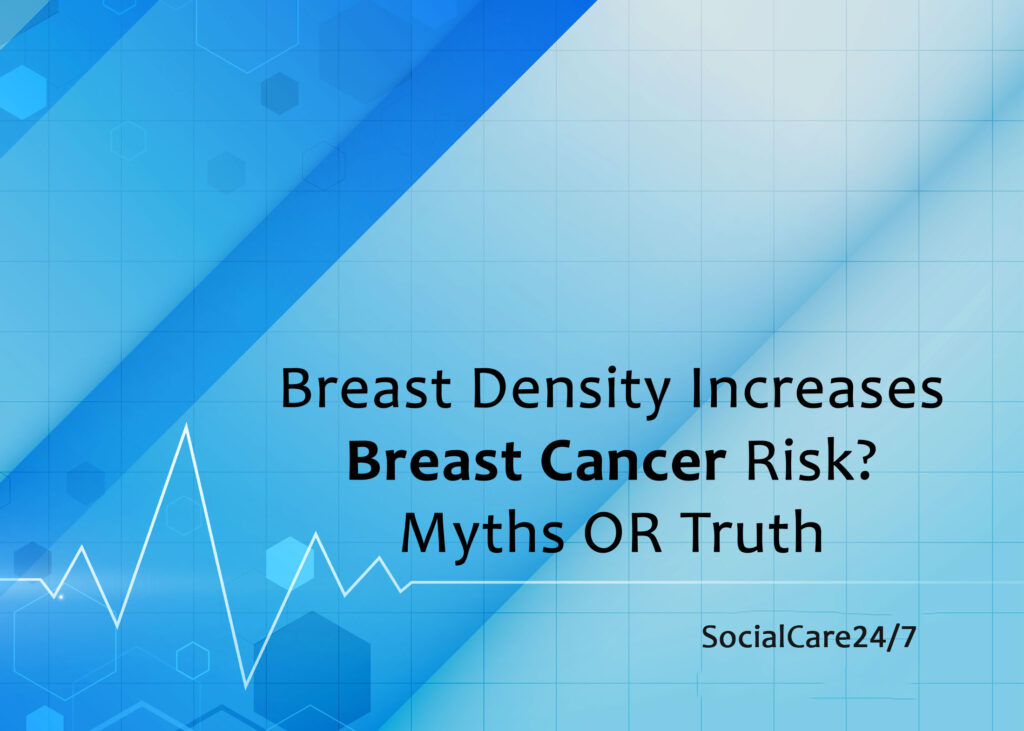People now fear hearing about breast cancer and knowing the reasons for breast cancer which helps you take major to prevent it. Among the various reasons for breast cancer breast density is now catching more attention on this. Many people wonder if having dense breast tissue can truly increase breast cancer risk. Truths and myths about breast mass are hard to distinguish.
This article examines the reality and myths regarding breast size and breast cancer risk. You’ll understand breast density’s health effects and breast cancer at the end of this.
What is Breast Density?
Breast density refers to breast tissue composition as seen on a mammogram. Fat, muscle, and glands can make breast density. Breasts with high density are more glandular and fibrous than fatty tissue. This is important because too much breast tissue might hide cancers on radiographer’s reports. From no fat to very thick, breast mass comes in four categories. A common descriptor for ladies with thick breasts is “heterogeneously dense” or “extremely dense.”
Genes, age, and hormones affect breast size. Breast fat increases with age. Breasts are more prominent and less firm in younger women. It is average for women to have varying breast densities. This may alter breast cancer screening and risk assessment for women.
Breast Density and Cancer Risk: Evidence
Research suggests that thick breasts increase the risk of breast cancer. Multiple studies demonstrate that having more breasts increases breast cancer risk. The American College of Radiology reports that thick breasts increase breast cancer risk by four to six times.
However, having a lot of breast tissue isn’t the leading risk factor for breast cancer. Age, family history, genetic alterations (such as BRCA1 and BRCA2), lifestyle, and hormones can cause breast cancer. A woman with dense breast tissue is more likely to have breast cancer, although she may not.
Common Myths Surrounding Breast Density
Even though individuals are learning more about breast density and breast cancer, many myths persist. Women must understand these fallacies to make healthy decisions.
Myth 1: Only Dense Breasts Are Cancerous
People assume cancer primarily affects large breasts. False. Breast cancer can occur in any breast tissue, oily or thick. Big breasts increase breast cancer risk, according to research. Still, check all breast tissue for changes. Checkups and body awareness are the most excellent strategies to detect cancer early, regardless of breast size.
Myth 2: All Women with Dense Breasts Will Get Cancer
A common belief is that all women with large breasts will acquire breast cancer. Big breasts are associated with cancer, yet most women don’t get it. All women should have frequent breast examinations and monitor their health. These practices are crucial for early issue detection.
Myth 3: Mammograms Are Ineffective for Women with Dense Breasts
Some think big-breasted ladies don’t require testing. Even if they can’t discover abnormalities in dense tissue, mammograms are still helpful for breast cancer screening. Women with big breasts need frequent mammograms. Consult their doctors about whether ultrasounds or MRIs are better screening methods.
Myth 4: If My Mother Had Dense Breasts, I Will Too
Many believe breast density is genetic; thus, if their mothers had thick breasts, so would they. In addition to heredity, hormone levels, age, and lifestyle choices impact breast growth. Therefore, every woman must know about her breast health and not rely on her family.
Women may manage breast health if they know these myths. Raising awareness and educating individuals helps reduce anxiety and make wise lifestyle and test decisions.
How to Manage Dense Breasts?
There are ways to improve breast health if your breasts are thick.
1. Regular Screenings
Regular scans help detect breast cancer early. Discuss with your doctor whether an ultrasound or MRI may assist with thick breasts. By improving dense tissue images, these methods can detect issues that regular mammography would overlook.
2. Self-Examinations
Regular self-exams help you understand your breast tissue. Schedule monthly checks for lumps, shape changes, and abnormal fluid. Knowing your breasts’ typical appearance might help you spot changes promptly and visit a doctor.
3. Lifestyle Choices
Healthy living significantly reduces breast cancer risk. A balanced diet including many kinds fruits, vegetables, and whole grains, is essential. Be active daily. Managing stress via athletics or mindfulness and consuming less alcohol can improve your health.
4. Stay Informed
Breast health education is crucial. Follow new research, risk variables, and screening tool advances. Knowing your body helps you make good decisions and talk critically with your doctor.
5. Genetic Counseling
Consult a genetic counselor if breast cancer runs in your family. BRCA and other gene mutation tests reveal your risk profile. This allows you to select proactive tracking and prevention methods. You can improve your breast health and confidence by practicing these things.
Future of Breast Density Awareness
As research advances, breast density is becoming a more common breast health subject. Medical professionals are striving to educate women about breast density. New techniques like 3D mammography and digital imaging can assist in locating thick breasts.
Advocacy organizations want consistent breast density reports. This would ensure all women receive breast health information. Knowing more about health helps women make better decisions and have more meaningful conversations with doctors.
Conclusion
Myths and realities regarding breast mass and cancer risk abound. Thick breasts increase your chance of breast cancer, but they don’t affect breast health alone. Staying informed and healthy is vital regardless of breast density.
Regular checkups, self-exams, and a healthy lifestyle reduce your risk. Remember that knowledge empowers. Knowing your body and its demands is the best health defence.
Consult your doctor if you’re worried about your breast mass or breast cancer risk.



